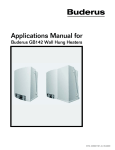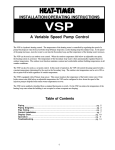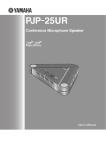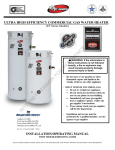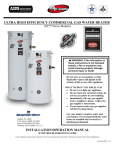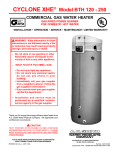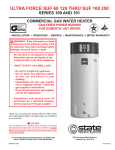Download Buderus GB142 Service manual
Transcript
BHSGB142-AM 01/05 Applications Manual for Buderus GB142 Wall Hung Heaters Table of Contents 1 Introduction 2 Description of Main Components Pre-piped Manifold and Pump Settings Pump Sizing for Buderus Indirect Tanks BC10 Controller RC10 Room Controller Space Heating Options DHW Heating Operation 3 5 2 2 4 4 4 4 Description of Operation Dimensions and Connections Space Heating Domestic Hot Water Heating 4 1 5 6 6 Venting Guidelines 7 Horizontal Venting Vertical Venting Condensate Piping 8 9 16 Piping and Wiring Applications Mechanical / Electrical Symbols GB142 with DHW zone and indoor reset GB142 with DHW zone and on/off heating zone GB142 with DHW zone, Comfort Zone and zone valves GB142 with DHW zone, Indoor reset, Buderus Pumping Station and zone valves GB142 with DHW zone, single temperature of radiant. No Mixing Valve required GB142 with DHW zone, motorize mixing valve zone, thermostatic mixing valves zone and high temperature zone. GB142 with DHW zone, and high temperature on/off zones GB142 with DHW zones, constant circulation with Comfort zone control GB142 with DHW zone and the Buderus Quick Fit Modular Piping systems 17 18 20 22 24 26 28 30 32 34 1 INTRODUCTION This GB142 Applications Manual is intended to present some of the most common applications of the wall-hung Buderus GB142 heater for use in hot water space heating applications. Applications are shown with both piping and corresponding electrical schematics. Auxiliary equipment depicted does not necessarily represent any one particular manufacturer or specific model number. There are a wide variety of techniques, practices and piping strategies possible with hydronic heating systems and it is the responsibility of the installing contractor to determine the most suitable arrangement for his application. In an effort to simplify piping and electrical diagrams, only Diagrams 1P and 1E depict the complete details with respect to piping and wiring of an indirect hot water tank. This part is left off all subsequent drawings for clarity purposes. Basic information regarding vent installation, clearances, condensate piping and termination locations are included as well. Although this manual covers many common applications for our equipment, system possibilities are virtually endless. Should you encounter an application that is not covered in this manual or have any questions regarding any of its content, we encourage you to contact your local sales rep or us directly at Buderus Hydronic Systems, USA. Version 1.0 01/05 Page 1 2 DESCRIPTION OF MAIN COMPONENTS PRE-PIPED MANIFOLD AND PUMP SETTINGS All GB142 are standard supplied with a pre-piped and wired heater manifold with pump to easily facilitate required primary/secondary piping for the installing contractor. Shut-offs, relief valve, pressure and temperature gauge, purge station on the supply leg and built-in flow check and a Grundfos UPS15-58 3-speed heater pump are included on the return side of the manifold. (Refer to Diagram 1P). Table 1 show ∆T values for different speed settings on the UPS15-58 pump for each GB142 model. Table 1: Max Heater ∆T (ºF) Values for UPS 15-58 Manifold Pump Heater Model Speed 1 Speed 2 26 20 GB142/24 33 25 GB142/30 42 32 GB142/45 N/A 43 GB142/60 Speed 3 17 21 28 32 Integrated heater controls will automatically reduce the heater input once the heater ∆T exceeds 45 ºF regardless of feedback single from the RC10 control. Complete burner shut-down will always take place before ∆T exceeds 99 ºF. The maximum flow rates are as follows: GB142/24 or /30: 11 GPM, model /45: 15 GPM, model /60: 20 GPM. PUMP SIZING FOR BUDERUS INDIRECT TANKS All heating zones are piped directly off the supply (left) side of the heater manifold; with heating returns combined on the return (right side). Piping connections for an indirect tank charging pump (PS) are included on the heater manifold. Refer to Tables 2 and 3 for tank pump recommendations for different Buderus indirect tanks. All piping to and from the indirect needs to be at least 1”. Use a minimum number of elbows and keep piping lengths to a minimum. Table 2: Indirect Pump Recommendations for GB142/24 and /30 models. GB142/24 GB142/30 Tank Model Grundfos Taco** B&G Grundfos Taco** UP14-42 3* 007 NRF22 UP26-64 0012 S120 UP26-64 0011 PL30 UP26-64 0013 ST150 UP26-64 0014 PL30 UP26-64 0011 ST200 UP26-64 0014 PL30 UP26-64 0011 ST300 0011 PL45 ST400 UP26-64 0017 PL30 UP26-64 0011 SU500 * Refers to Grundfos UP15-42 w/ built-in flow check and speed setting ** Refers to Taco 007 without built-in flow check Page 2 B&G PL30 PL35 PL45 PL30 PL45 Version 1.0 01/05 Table 3: Indirect Pump Recommendations for GB142/45 and /60 models. GB142/45 GB142/60 Tank Model Grundfos Taco** B & G Grundfos Taco** B&G UP26-64 0014 PL36 UP26-64 0011 PL30 S120 UP26-99 PL36 0013 PL36 ST150 UP26-99 PL36 0013 PL36 ST200 0013 PL36 PL36 ST300 ST400 PL36 SU500 UP26-64 0011 PL30 0011 PL36 SU750 *** UP26-64 0012 PL30 UP26-64 0012 PL30 SU1000 *** * Refers to Grundfos UP15-42 w/ built-in flow check and speed setting ** Refers to Taco 007 without built-in flow check *** SU750 and SU1000 tanks are non stock. Allow 6 to 8 weeks for delivery. Tables 4 and 5 show pump recommendations for 2 and 3 tank systems operating off a single GB142 heater. Tank pumps are placed in parallel with each tank having its own pump. The GB142 DHW sensor is placed in one tank; a high limit aquastat is to be installed in other tanks and wired in series with the pump power to prevent over heating. Domestic water must be drawn equally from the tanks. Table 4: Two Tank Systems GB142/30 B&G Grundfos Taco Tank 15-42 009 ST150 PL50 15-42 009 ST200 PL50 15-42 009 ST300 PL50 15-42 009 ST400 PL50 Table 5: Three Tank Systems GB142/30 B & G Grundfos Taco Tank 008 ST150 NRF22 15-42 008 ST200 NRF22 15-42 008 ST300 NRF22 15-42 008 ST400 NRF22 15-42 GB142/45 GB142/60 B&G Grundfos Taco B&G Grundfos Taco PL30 PL30 PL30 PL30 26-64 26-64 26-64 26-64 0014 0014 0014 0014 PL30 PL30 PL30 PL30 26-64 26-64 26-64 26-64 0011 0011 0011 0011 GB142/45 GB142/60 B&G Grundfos Taco B&G Grundfos Taco PL30 PL30 PL30 PL30 26-64 26-64 26-64 26-64 009 009 009 009 PL50 PL30 PL30 PL30 26-64 26-64 26-64 26-64 0014 0014 0014 0014 Electrically the GB142 has 120 V connections for the heater manifold pump PK (4 Amp max), indirect tank charging pump PS and DHW recirculation pump PZ (Max Amp draw of 5 Amp for PS and PZ combined). Version 1.0 01/05 Page 3 The low voltage side is equipped with the following terminals: 1) RC terminals (orange color) for an indoor room sensor for firing and modulating the burner. (RC10 control standard supplied with GB142). 2) FA optional outdoor sensor terminals (blue color) connections (requires RC34 controller; available Fall 2005). 3) WA T-T terminals (light green color) connections for optional conventional thermostat. 4) FW DHW tank sensor terminals (light gray color) for sensing tank water temperature. (Tank sensor standard supplied with GB142). 5) EV terminals (red color) for connecting of an optional safety such as LWCO, manual reset high limit or any other type of external limit circuit. BC10 CONTROLLER A BC10 control panel is installed in every GB142 which includes a diagnostic display, status indicator lights, dials for DHW and maximum heater temperature as well as programming and diagnostic access buttons. A detailed description of all diagnostic and status codes is provided with the GB142 Installation and Service Manual. RC10 ROOM CONTROLLER A RC10 room controller is provided with every GB142 to provide indoor reset and pin point precision control back to the BC10. The RC10 must be installed in a reference location for indoor feedback to the GB142. The RC10 will control the modulation and heater water temperature based on maintaining desired indoor comfort levels. The RC10 is typically placed in the main living area for optimum comfort and accurate temperature control. Give careful consideration to the placement of the RC10 sensor. The use of the RC10 indoor room controller is shown in a number of diagrams to achieve maximum comfort and efficiency from the product. Suggested timings of the post purge for the boiler pump (PK) are shown on each wiring diagram. Note: Never connect a RC10 control and a thermostat or end switch at the same time. SPACE HEATING OPERATION: The PK boiler pump operates and the burner fires on a call for heat from the T-T terminal or from the RC10 controller. Use only T-T connections or RC terminals, but do NOT use both at the same installation. Once the call for heat is satisfied, the PK pump continues to operate through an adjustable programmable post-purge cycle before shutting down. The PK pump can also set to operate continuously for up to 24 hours after the last call for heat. DHW HEATING OPERATION: A call for heat from the FW (DHW) sensor brings the control into DHW priority, shutting off the PK pump, firing the boiler to maximum temperature and operating the PS pump. Internal logic includes an anticipative DHW heating cycle with automatically adjusting post purge feature and reduces burner modulation rate. Page 4 Version 1.0 01/05 3 DIMENSIONS, CONNECTIONS AND and CLEARANCES CLEARANCES Fig. 1: Dimensions and Connections for GB142/24 and /30. Fig. 2: Dimensions and Connections for GB142/45 and /60. Version 1.0 01/05 Page 5 4 VENTING GUIDELINES VENTING GUIDELINES The GB142 is suitable for side-wall as well as vertical venting using field supplied 3” PVC or CPVC pipe in compliance with ANSI, ASTM D1785 (schedule 40 PVC), F441 or D2665 (PVCDWV). Cement and primer must comply with ASTM D2564. For Canada, use CSA or ULC certified PVC or CPVC pipe, fittings and cement. Foam core PVC pipe can not be used. Note: Installation must comply with local requirements/codes, National Fuel Gas Code, ANZI Z223.1 (USA installations) CSA B149.1 or B149.2 (Canadian installations) Note: Installing contractor must install condensate tee (supplied by Buderus) immediately after the first 90 degree flue elbow. Condensate must be drained into a condensate pump or appropriate drain. The GB142 is approved for both Direct Vent (sealed-combustion - see FIG. 3A for termination location) as well as Direct Exhaust (non sealed-combustion - see FIG. 3B for termination location) operation in both a horizontal and vertical vent arrangement. For room air applications, follow National Fuel Gas Code to ensure ample combustion air. All PVC venting material is approved for 0” clearance to combustibles for venting of the GB142 boiler. Table 6: Maximum Equivalent Vent Lengths Model Max Eq. Intake Length (ft) GB142/24, /30, /44 100 GB142/60 60 Max Eq. Exhaust Length (ft) 100 60 Table 7: Friction Loss Equivalent for Fittings Fittings or Piping Equivalent Length (ft) 45 ºElbow 3 90º Elbow 5 Optional Concentric Vent Kit 3 Page 6 Version 1.0 01/05 Fig. 3A 12" minimum 12" minimum 12" minimum Fig 3B Version 1.0 01/05 Page 7 DIRECT VENT/SEALED COMBUSTION & DIRECT VENT/NON-SEALED COMBUSTION TERMINATION GUIDELINES WARNING: Follow these instructions when determining vent termination location to avoid possibility of severe personal injury, death, substantial property damage or cross contamination of combustion air. Gas vent extending through an exterior wall shall not terminate adjacent to the wall or below building extensions such as eaves, parapets, balconies or decks. Failure to comply could result in severe personal injury, death or substantial property damage. Locate the concentric vent/air termination using the following guidelines. • The total length of piping for vent or combustion air should not exceed the limits in Table 6 for maximum output. • One must consider the immediate environment when locating the vent/air termination. Gases will form a white plume in winter. Plume could obstruct window view. Prevailing winds could freeze condensate and cause water/ice buildup on building, plants or roof. Do not terminate vent in window well, stairwell, alcove, courtyard, or other recessed areas. • Maintain Minimum Clearances below to prevent potential problems; 1. Vent must terminate at least 12 inches above grade, anticipated snow line or roof surface (Canada 18” minimum). 2. Vent termination must be at least 7 feet above a public walkway. 3. Vent must be 3 feet above any forced air intake within 10 feet. 4. Vent must terminate at least 3 feet horizontally, from electric meters, gas meters, regulators, relief valves, and other equipment, and in no case above or below, unless a 3 feet horizontal distance is maintained 5. Do not extend exposed vent pipe outside the building beyond recommended distance. Condensate could freeze and block vent pipe. 6. Vent should terminate at least 3 feet away from adjacent walls, inside corners and below roof overhang. 7. It is not recommended to terminate vent above any door or window, condensate can freeze causing ice formations. 8. Do not use chimney as a raceway if another appliance or fireplace is vented into or through chimney. 9. The exhaust vent must be pitched up toward the termination a minimum of ¼” in. per foot. Condensate must flow back to the Boiler freely, without accumulating in the vent. 10. Multiple boiler vent terminations; See Venting application. Page 8 Version 1.0 01/05 EXHAUST AND INTAKE AIR PLACEMENT THROUGH THE ROOF PENETRATION — CONCENTRIC*: 1. Determine best location for vent/air termination using previous guidelines. 2. Cut a 5” hole to accommodate the 4½” diameter PVC pipe. 3. Cement termination concentric Y to 4½” diameter PVC pipe, then pass through roof penetration and field supplied roof boot/flashing. 4. Secure assembly to roof structure with field supplied metal strapping or equivalent support material. 5. Insert smaller 2½” PVC vent exhaust pipe into larger 4½” diameter combustion air pipe ensuring PVC exhaust vent pipe is properly cement into concentric Y. 6. Cement vent exhaust pipe and air inlet pipe onto concentric vent termination. 7. Concentric vent termination cannot be extended beyond manufactured length. 8. Concentric vent termination may be cut to desired length. 9. Concentric vent shall terminate at least 12 inches above snow line but not more 24 inches above roof surface. (see FIG.4 and FIG. 5 for details) 10. Operate heater through one complete cycle and check for flue gas leakage. 11. Refer to fig. 6 for multiple “Through the roof” installations and maintain a 12” center-tocenter distance. * Buderus Part Number: BRYKGAVT0602CVT Version 1.0 01/05 Page 9 Page 10 Version 1.0 01/05 SIDE-WALL PENETRATION (CONCENTRIC) 1. Determine best location for vent/air termination using previous guidelines (FIG. 3A & 7). 2. Cut a 5” hole to accommodate the 4½” diameter PVC pipe. 3. Cement termination concentric Y to 4½” diameter PVC pipe, then pass through wall penetration and field supplied flashing if required. 4. Insert smaller 2½” PVC vent exhaust pipe into larger 4½” diameter combustion air pipe ensuring PVC exhaust vent pipe is properly cement into concentric Y. 5. Cement vent exhaust pipe and air inlet pipe onto concentric vent termination. 6. Concentric vent termination cannot be extended beyond manufactured length. 7. Concentric vent termination may be cut to desired length. 8. Operate heater through one complete cycle and check for flue gas leakage. 9. Allow 8” center to center horizontal distance between concentric vent terminations with multiple heater installations. Version 1.0 01/05 Page 11 THROUGH THE ROOF PENETRATION (NON-CONCENTRIC) 1. Determine best location for vent/air termination using previous guidelines. 2. Air pipe penetration – Cut a hole for the air pipe. Size the air pipe hole as close as desired to the air pipe outside diameter. 3. Vent pipe penetration – Cut a hole for the vent pipe. Size the vent pipe hole as close as desired to the vent pipe outside diameter. 4. Space the air and vent holes to provide the minimum spacing (see FIG. 8). 5. Follow all local codes for isolation of vent pipe when passing through floors, ceilings and roofs. 6. Install a field supplied roof penetration boot/flashing. Fig. 8 24" minimum Minimum 12" Maximum 24" Page 12 Minumum of 12" above roof line/snow line Version 1.0 01/05 TERMINATION AND FITTING 1. Prepare the vent termination coupling and the air termination elbow by inserting the bird screens provided with boiler into the three inch fittings. 2. The combustion air inlet shall terminate at least 12 inches above maximum snow line or 24 inches above roof surface which ever is greater. 3. The combustion air inlet pipe must terminate in a downward position using two 90 degree elbows. The combustion air inlet pipe shall terminate at least two feet horizontally from the center line of the exhaust vent, this is to prevent cross contamination of flue gases into the combustion air stream. 4. The exhaust vent must terminate vertically upward with a coupling and bird screen. The top of the coupling shall termination at least 12 inches above the bottom of the downturned 90° elbow, but no more than 24 inches. MULTIPLE HEATER INSTALLATION Terminate all exhaust vents at the same height and all combustion air inlets at the same height, while maintaining the minimum 12” to a maximum of 24” height clearance from the exhaust to the down turned 90 degree elbow and combustion air inlet. Exhaust vent termination edge shall be at least 12” from the edge of the air inlet pipe of an adjacent heater. Exhaust vent terminations may be place next to each other as practical, like wise air intake terminations may also be placed next to each other. The combustion air inlet is part of the direct vent system and not classified as a forced air inlet (see FIG. 9A and 9B). Minimum 12" Maximum 24" Fig. 9A Minimum 24" from center to center 12" Minimum Version 1.0 01/05 Page 13 SIDE-WALL PENETRATION (NON-CONCENTRIC) 1. Determine best location for vent/air termination using previous guidelines. 2. Cut a 4” hole to accommodate the 3½” diameter PVC pipe. Through the wall penetration may be sealed with a field provided flashing if required. 3. Insert bird screens provided with heater into both exhaust and combustion air (field supplied) elbows. 4. Combustion air inlet elbow should always be positioned downward. 5. The exhaust outlet or elbow shall always be positioned pointing away from the building. 6. Combustion air inlet elbow must terminate at least 12” below exhaust elbow or outlet, but not exceed 15” maximum separation. 7. Combustion air inlet must maintain at least 12” above grade and/or snow line. 8. Combustion air inlet may be extended vertically upward a maximum of 24” from the building penetration (see FIG. 10). 9. Do not extend exposed exhaust vent pipe outside the building beyond recommendations. 10. Horizontal termination shall not extend beyond 18 inches from the building (based on minimum 12 inch required separation between intake and exhaust). Exhaust vent vertical rise shall not extend beyond 39” from building penetration to termination elbow. Condensate could freeze and block vent pipe. 11. Operate heater through one complete cycle and check for flue gas leakage. Page 14 Version 1.0 01/05 Multiple Heater installation – Terminate all exhaust vents at the same height and all combustion air inlets at the same height, while maintaining the minimum 12 inches vertical height clearance from between exhaust and combustion air inlet. Exhaust vent termination edge shall be at least 12 inches laterally from the edge of the air inlet pipe of an adjacent heater. The combustion air inlet is part of the direct vent system and not classified as a forced air inlet. Version 1.0 01/05 Page 15 CONDENSATE PIPING Figure 10 shows a typical sealed combustion installation. • The furnished 3” x ¾” socket female vent condensate drain must be installed as close as possible to the exhaust connection with the ¾” branch pointing down to drain condensate. • Install furnished 1-1/2” x ¾” coupling under GB142 condensate drain, install a ¾” PVV tee and bring in upper vent drain with a trap into this tee. • Pour 1 qt. of water in exhaust pipe and make sure to fill the external trap and internal trap of the GB142. • In case of vertical venting, install a short horizontal run to install the vent condensate drain. Page 16 Version 1.0 01/05 5 DRAWINGS Version 1.0 01/05 Page 17 Drawing #GB142-1P Baseboard Buderus Hydronic Systems GB 142, with DHW zone and indoor reset. exhaust Purge stations required. intake Written by JHK DHW recirc Line Approved by EFS 7/09/04 DHW Out Condensate Drain PZ Supply Return Purge Station Control Panel Gas Connection ¾” P1 P&T Gauge PS PK Buderus Indirect water heater Purge Station Purge Station Water Feed DHW In Note: This drawing is conceptual in nature and does not purport to address all design, installation or safety considerations. Additional safety and/or auxiliary equipment may be needed. This diagram is for reference use by officials, designers and licensed installers. It is expected that installers have adequate knowledge of accepted industry practices for the equipment, procedures, and applications involved. Drawing is not to scale. Page 18 Version 1.0 01/05 Low Voltage RC 10/20 Outdoor sensor T T Connection DHW Sensor Safety Limit Orange Blue Lt Green Lt Gray Red RC FA WA FW EV 1 2 1 2 1 2 120Vac/10Amp Max 5 Amp Max 1 2 1 Green PK 61 Grey PS 63 24 lilac PZ 25 13 White Power Input 14 N L 2 Service switch Dedicated 15 Amp Circuit 120Vac 2 Factory Installed Jumper Netural PK PZ DHW Tank Sensor Boiler loop circulator P1 PS Optional DHW Recirc Circulator 2 R Heating loop circulator No connection required when using RC10/20 Room Sensor DHW Circulator C Recommended Post Purge setting: 5 minutes Drawing # GB142-1E RC 10/20 Room Sensor Buderus Hydronic Systems Low Voltage Field installed GB 142, with DHW zone and indoor reset . Field wiring - 120Vac Written by JHK Approved by EFS 7/09/04 Note: This drawing is conceptual in nature and does not purport to address all design, installation or safety considerations. Additional safety and/or auxiliary equipment may be needed. This diagram is for reference use by officials, designers and licensed installers. It is expected that installers have adequate knowledge of accepted industry practices for the equipment, procedures, and applications involved. Drawing is not to scale. Version 1.0 01/05 Page 19 Drawing # GB142-2P Baseboard Buderus Hydronic Systems GB 142, with DHW zone and on/off heating zone. exhaust Purge stations required. intake Written by JHK Approved by EFS 7/09/04 Supply Return Condensate Drain Control Panel Purge Station Gas Connection ¾” P1 PS P&T Gauge PK Purge Station Purge Station Buderus Indirect water heater Note: This drawing is conceptual in nature and does not purport to address all design, installation or safety considerations. Additional safety and/or auxiliary equipment may be needed. This diagram is for reference use by officials, designers and licensed installers. It is expected that installers have adequate knowledge of accepted industry practices for the equipment, procedures, and applications involved. Drawing is not to scale. Page 20 Version 1.0 01/05 RC 10/20 Outdoor sensor TT Connection DHW Sensor Safety Limit Orange Blue Lt Green Lt Gray Red RC 1 FA 2 1 WA 2 1 FW 2 120Vac/10Amp Max 5 Amp Max Low Voltage 1 Green PK EV 2 1 61 Grey PS 63 24 lilac PZ 25 13 Dedicated 15 Amp Circuit White Power Input 14 N L 2 Service switch 1 3 Factory Installed Jumper DHW Tank Sensor 120Vac Netural PK PS Boiler loop circulator DHW Circulator 1 Thermostat 3 Optional DHW Recirc circulator For optional RC10/20 . Do not use if using T T connection. P1 Must be electronic type of thermostat. Recommended Post Purge setting: 5 minutes Drawing # GB142-2E Buderus Hydronic Systems Low Voltage Field installed GB 142, with DHW zone and on/off heating zone. Field wiring - 120 Vac Written by JHK Approved by EFS 7/09/04 Note: This drawing is conceptual in nature and does not purport to address all design, installation or safety considerations. Additional safety and/or auxiliary equipment may be needed. This diagram is for reference use by officials, designers and licensed installers. It is expected that installers have adequate knowledge of accepted industry practices for the equipment, procedures, and applications involved. Drawing is not to scale. Version 1.0 01/05 Page 21 Drawing #GB142-3P Buderus Hydronic Systems GB 142, with DHW zone, Comfort Zone and zone valves. exhaust intake Purge stations required Written by JHK Approved by EFS 7/09/04 Logamax Plus GB142 Supply Return Condensate Drain DHW Return Gas Connection ¾” Comfort Zone Return from Heating zones PS Zone Valves Z Z Z Purge Station Control Panel P&T Gauge PK DHW Supply Purge Station Purge Station P1 Note: This drawing is conceptual in nature and does not purport to address all design, installation or safety considerations. Additional safety and/or auxiliary equipment may be needed. This diagram is for reference use by officials, designers and licensed installers. It is expected that installers have adequate knowledge of accepted industry practices for the equipment, procedures, and applications involved. Drawing is not to scale. Page 22 Version 1.0 01/05 Low Voltage Comfort Zone Control RC 10/20 Outdoor sensor TT Connection DHW Sensor Safety Limit Orange Blue Lt Green Lt Gray Red RC FA WA FW EV 1 R 2 1 2 1 2 120Vac/10Amp Max 5 Amp Max 1 2 1 Green PK 61 2 Grey PS 63 24 lilac PZ 25 White Power Input 13 14 N L 1 2 Factory Installed Jumper C DHW Tank Sensor RC 10/20 Room Sensor 120Vac PK Netural Boiler loop circulator P1 PS 1 T Stat T Stat Service switch Dedicated 15 Amp Circuit Heating loop circulator T Stat Optional DHW Recirc circulator DHW Circulator 2 No connection required when using RC10/ 20 Room Sensor Dedicated 15 Amp Circuit 24 VAC transformer 120Vac Recommended Post Purge setting: 5 minutes Neutral Drawing # GB142-3E Buderus Hydronic Systems Zone valves No end switch connection needed Low Voltage Field installed GB 142, with DHW zone, Comfort Zone Control and zone valves. Field wiring 120Vac Written by JHK Approved by EFS 7/09/04 Note: This drawing is conceptual in nature and does not purport to address all design, installation or safety considerations. Additional safety and/or auxiliary equipment may be needed. This diagram is for reference use by officials, designers and licensed installers. It is expected that installers have adequate knowledge of accepted industry practices for the equipment, procedures, and applications involved. Drawing is not to scale. Version 1.0 01/05 Page 23 Drawing #GB142-4P Buderus Hydronic Systems GB 142, with DHW, Indoor reset (RC10/20) with Buderus Pumping Station and zone valves. Radiation Purge stations required. Written by JHK exhaust Z Z Approved by EFS 7/09/04 intake Z Logamax Plus GB142 Supply Return Condensate Drain Purge Station Control Panel DHW return Gas Connection ¾” BPS1 Buderus Pump Station PS P&T Gauge PK DHW supply Purge Station Purge Station Note: This drawing is conceptual in nature and does not purport to address all design, installation or safety considerations. Additional safety and/or auxiliary equipment may be needed. This diagram is for reference use by officials, designers and licensed installers. It is expected that installers have adequate knowledge of accepted industry practices for the equipment, procedures, and applications involved. Drawing is not to scale. Page 24 Version 1.0 01/05 RC 10/20 Outdoor sensor TT Connection DHW Sensor Safety Limit Orange Blue Lt Green Lt Gray Red RC 1 FA 2 1 WA 2 1 FW 2 120Vac/10Amp Max 5 Amp Max Low Voltage 1 Green PK EV 2 1 61 Grey PS 63 24 lilac PZ 25 White Power Input 13 14 N L 2 Service switch Dedicated 15 Amp Circuit 1 2 120Vac PK Factory Installed Jumper Comfort Zone Control Netural R DHW Tank Sensor C Boiler loop circulator BPS1 PS RC 10/20 Room Sensor Heating loop circulator T Stat T Stat DHW Circulator T Stat 1 Optional DHW Recirc circulator 2 No connection required when using RC10/20 Room Sensor Recommended Post Purge setting: 5 minutes 24 VAC transformer Drawing # GB142-4E Dedicated 15 Amp Circuit Zone valves Buderus Hydronic Systems Neutral No end switch connection needed 120Vac Low Voltage Field installed GB 142, with DHW zone, Indoor reset (RC10/20) with Buderus Pumping Station and zone valves. Field wiring 120Vac Written by JHK Approved by EFS 7/09/04 Note: This drawing is conceptual in nature and does not purport to address all design, installation or safety considerations. Additional safety and/or auxiliary equipment may be needed. This diagram is for reference use by officials, designers and licensed installers. It is expected that installers have adequate knowledge of accepted industry practices for the equipment, procedures, and applications involved. Drawing is not to scale. Version 1.0 01/05 Page 25 Drawing # GB142-5P Buderus Hydronic Systems exhaust GB 142, with DHW zone single temperature of radiant. no mixing valve required. “Space Heating” high limit on GB142 should be set to maximum zone temperature. intake Purge stations required. Logamax Plus GB142 Written by JHK Control Panel Purge Station DHW Return Gas Connection ¾” DHW Supply 7/09/04 Supply Return Condensate Drain Strap on high limit Approved by EFS PS P&T Gauge PK Purge Station Purge Station Air Scoop P1 Note: This drawing is conceptual in nature and does not purport to address all design, installation or safety considerations. Additional safety and/or auxiliary equipment may be needed. This diagram is for reference use by officials, designers and licensed installers. It is expected that installers have adequate knowledge of accepted industry practices for the equipment, procedures, and applications involved. Drawing is not to scale. Page 26 Version 1.0 01/05 RC 10/20 Outdoor sensor T T Connection DHW Sensor Safety Limit Orange Blue Lt Green Lt Gray Red RC 1 FA 2 1 WA 2 1 120Vac/10Amp Max 5 Amp Max Low Voltage FW 2 1 Green PK EV 2 1 61 Grey PS 63 24 lilac PZ 25 13 White Power Input 14 N L 2 Service switch Dedicated 15 Amp Circuit 1 120Vac 2 R Netural PK PS Boiler loop circulator DHW Circulator C RC 10/20 Room Sensor DHW Tank Sensor P1 Heating loop circulator 1 Optional DHW Recirc circulator 2 No connection required when using RC10/20 Room Sensor 4 High Limit to prevent exceeding maximum zone temperature High Limit (Strap on or immersion type) 4 Recommended Post Purge setting: 5 minutes Drawing # GB142-5E Buderus Hydronic Systems Low Voltage Field installed Field wiring - 120 Vac GB 142, with DHW zone, single temperature of radiant. No mixing valve required. “Space Heating” high limit on GB142 should be set to maximum zone temperature. Written by JHK Approved by EFS 7/09/04 Note: This drawing is conceptual in nature and does not purport to address all design, installation or safety considerations. Additional safety and/or auxiliary equipment may be needed. This diagram is for reference use by officials, designers and licensed installers. It is expected that installers have adequate knowledge of accepted industry practices for the equipment, procedures, and applications involved. Drawing is not to scale. Version 1.0 01/05 Page 27 GB Drawing #142-6P Buderus Hydronic Systems Baseboard exhaust GB 142, with DHW zone, motorized (TC-62 motor) mixing valve zone, thermostatic (manual) mixing valve zone and high temperature zone. intake Purge stations required. Written by JHK Approved by EFS 7/09/04 Logamax Plus GB142 Supply Return Condensate Drain Purge Station Control Panel DHW Return P3 P2 P1 Gas Connection ¾” DHW Supply P&T Gauge PS TC 62 PK Purge Station Purge Station Note: This drawing is conceptual in nature and does not purport to address all design, installation or safety considerations. Additional safety and/or auxiliary equipment may be needed. This diagram is for reference use by officials, designers and licensed installers. It is expected that installers have adequate knowledge of accepted industry practices for the equipment, procedures, and applications involved. Drawing is not to scale. Page 28 Version 1.0 01/05 RC 10/20 Outdoor sensor T T Connection DHW Sensor Safety Limit Orange Blue Lt Green Lt Gray Red RC FA WA FW EV 1 2 1 2 1 2 120Vac/10Amp Max 5 Amp Max Low Voltage 1 2 1 Green PK 61 Grey PS 63 24 lilac PZ 25 13 White Power Input 14 N L 2 Service switch Dedicated 15 Amp Circuit 1 3 Factory Installed Jumper 120Vac Netural PK PS Boiler loop circulator DHW Circulator DHW Tank Sensor T Stat T Stat Zone 1 X X Zone 1 Zone 2 Zone 2 T Stat 1 Optional DHW Recirc circulator 3 For optional RC10/20 Room Sensor. Do not use if using T T connection Zone 3 Zone 3 N L Dedicated 15 Amp Circuit 120 Vac Neutral Recommended Post Purge setting: 5 minutes P1 Drawing # GB142-6E Buderus P2 Hydronic Systems P3 Low Voltage Field installed GB 142, with DHW zone, motorized (TC-62 motor) mixing valve zone, thermostatic (manual) mixing valve zone and high temperature zone. Field wiring - 120 Vac Written by JHK Approved by EFS 7/09/04 Note: This drawing is conceptual in nature and does not purport to address all design, installation or safety considerations. Additional safety and/or auxiliary equipment may be needed. This diagram is for reference use by officials, designers and licensed installers. It is expected that installers have adequate knowledge of accepted industry practices for the equipment, procedures, and applications involved. Drawing is not to scale. Version 1.0 01/05 Page 29 Drawing #GB142-7P Buderus Hydronic Systems GB 142, with DHW zone and high temperature on/off heating zones. exhaust intake Baseboard Purge stations required. Written by JHK Approved by EFS 7/09/04 Logamax Plus GB142 Supply Return Condensate Drain Purge Station Control Panel DHW Return Gas Connection ¾” DHW Supply P3 P2 P1 P&T Gauge PS PK Purge Station Purge Station Note: This drawing is conceptual in nature and does not purport to address all design, installation or safety considerations. Additional safety and/or auxiliary equipment may be needed. This diagram is for reference use by officials, designers and licensed installers. It is expected that installers have adequate knowledge of accepted industry practices for the equipment, procedures, and applications involved. Drawing is not to scale. Page 30 Version 1.0 01/05 RC 10/20 Outdoor sensor T T Connection DHW Sensor Safety Limit Orange Blue Lt Green Lt Gray Red RC FA WA FW EV 1 2 1 2 1 2 120Vac/10Amp Max 5 Amp Max Low Voltage 1 2 1 Green PK 61 Grey PS 63 24 lilac PZ 25 White Power Input 13 14 N L 2 Service switch Dedicated 15 Amp Circuit 1 120Vac 3 Factory Installed Jumper Netural PK PS Boiler loop circulator DHW Circulator DHW Tank Sensor T Stat T Stat Zone 1 X X Zone 2 Zone 1 Zone 2 T Stat 1 Optional DHW Recirc circulator 3 For optional RC10/20 Room Sensor. Do not use if using T T connection Zone 3 Zone 3 N L Dedicated 15 Amp Circuit 120 Vac Neutral Recommended Post Purge setting: 5 minutes P1 Drawing # GB142-7E Buderus P2 Hydronic Systems P3 Low Voltage Field installed GB 142, with DHW zone, and high temperature on/off zones. Field wiring - 120 Vac Written by JHK Approved by EFS 7/09/04 Note: This drawing is conceptual in nature and does not purport to address all design, installation or safety considerations. Additional safety and/or auxiliary equipment may be needed. This diagram is for reference use by officials, designers and licensed installers. It is expected that installers have adequate knowledge of accepted industry practices for the equipment, procedures, and applications involved. Drawing is not to scale. Version 1.0 01/05 Page 31 Drawing #GB142-8P Buderus Hydronic Systems GB 142 with DHW zone, constant circulation with Comfort Zone Control. Buderus Panel Radiators with Thermostatic Heads exhaust intake Thermostatic heads on each Panel Radiator for individual control. Pressure by-pass valve required. Purge stations required. Logamax Plus GB142 Written by JHK Condensate Drain Approved by EFS 7/09/04 Purge Station Control Panel DHW Return Gas Connection ¾” DHW Supply PS P&T Gauge PK Purge Station Purge Station P1 Pressure by-pass valve Note: This drawing is conceptual in nature and does not purport to address all design, installation or safety considerations. Additional safety and/or auxiliary equipment may be needed. This diagram is for reference use by officials, designers and licensed installers. It is expected that installers have adequate knowledge of accepted industry practices for the equipment, procedures, and applications involved. Drawing is not to scale. Page 32 Version 1.0 01/05 Low Voltage RC 10/20 Outdoor sensor T T Connection DHW Sensor Safety Limit Orange Blue Lt Green Lt Gray Red RC FA WA FW EV 1 2 1 2 1 2 120Vac/10Amp Max 5 Amp Max 1 2 1 Green PK 61 Grey PS 63 24 lilac PZ 25 White Power Input 13 14 N L 2 Service switch Dedicated 15 Amp Circuit 120Vac Comfort Zone Control Factory Installed Jumper Netural PK PZ R DHW Tank Sensor C Boiler loop circulator Optional DHW Recirc Circulator P1 PS Heating loop circulator DHW Circulator RC 10/20 Room Sensor Recommended Post Purge setting: 5 minutes Drawing # GB142-8E Buderus Hydronic Systems GB 142, with DHW zone, constant circulation with Comfort Zone Control. Low Voltage Field installed Field wiring - 120Vac Pressure by-pass valve required. Written by JHK Approved by EFS 7/09/04 Note: This drawing is conceptual in nature and does not purport to address all design, installation or safety considerations. Additional safety and/or auxiliary equipment may be needed. This diagram is for reference use by officials, designers and licensed installers. It is expected that installers have adequate knowledge of accepted industry practices for the equipment, procedures, and applications involved. Drawing is not to scale. Version 1.0 01/05 Page 33 Drawing #GB142-9P Buderus Hydronic Systems Baseboard GB 142 with DHW zone and the Buderus Quick Fit Modular Piping System. exhaust intake Purge stations required. Written by JHK Approved by EFS 7/09/04 Logamax Plus GB142 Buderus Mixing Station Buderus Mixing Station BPS2 BPS1 Condensate Drain Control Panel BPS3 Buderus Pump Station TC 62 TC 62 Purge Station DHW return Gas Connection ¾” DHW supply PS P&T Gauge PK Buderus 3 Station Header Purge Station Purge Station Optional Supply port – cap (included) if not used Note: This drawing is conceptual in nature and does not purport to address all design, installation or safety considerations. Additional safety and/or auxiliary equipment may be needed. This diagram is for reference use by officials, designers and licensed installers. It is expected that installers have adequate knowledge of accepted industry practices for the equipment, procedures, and applications involved. Drawing is not to scale. Page 34 Version 1.0 01/05 RC 10/20 Outdoor sensor T T Connection DHW Sensor Safety Limit Orange Blue Lt Green Lt Gray Red RC 1 FA 2 1 WA 2 1 FW 2 120Vac/10Amp Max 5 Amp Max Low Voltage 1 Green PK EV 2 1 61 Grey PS 63 24 lilac PZ 25 13 White Power Input 14 N L 2 Service switch Dedicated 15 Amp Circuit 1 3 Factory Installed Jumper 120Vac Netural PK PS Boiler loop circulator DHW Circulator DHW Tank Sensor T Stat Zone 1 X X T Stat Zone 2 Zone 1 Zone 2 T Stat 1 Optional DHW Recirc circulator 3 For optional RC10/20 Room Sensor. Do not use if using T T connection Zone 3 Zone 3 N L Dedicated 15 Amp Circuit 120 Vac Neutral Recommended Post Purge setting: 5 minutes BPS1 Drawing # GB142-9E Buderus BPS2 Hydronic Systems BPS3 Low Voltage Field installed GB 142, with DHW zone and the Buderus Quick Fit Modular Piping System. Field wiring - 120 Vac Written by JHK Approved by EFS 7/09/04 Note: This drawing is conceptual in nature and does not purport to address all design, installation or safety considerations. Additional safety and/or auxiliary equipment may be needed. This diagram is for reference use by officials, designers and licensed installers. It is expected that installers have adequate knowledge of accepted industry practices for the equipment, procedures, and applications involved. Drawing is not to scale. Version 1.0 01/05 Page 35 Buderus Hydronic Systems 50 Wentworth Avenue Londonderry, NH 03053 Tel: 603-552-1100 • Fax: 603-421-2719 www.buderus.net Buderus Hydronic Systems, reserves the right to make changes without notice due to continuing engineering and technological advances








































